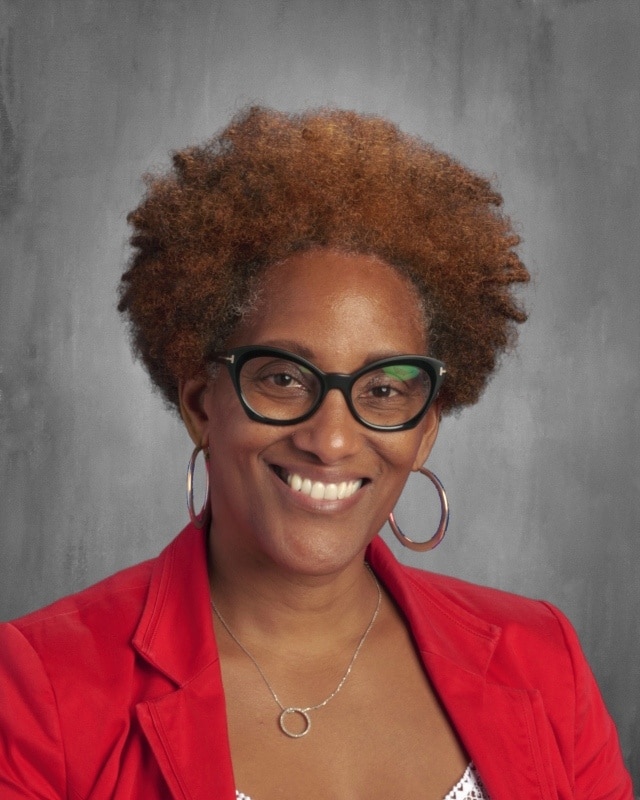A Personal Reflection on Black History Month
 We asked Shavonda Robinson—a longstanding member of the Oak Knoll community—to personally reflect on what Black History Month means to her. Shavonda has been at Oak Knoll for 22 years and began as a combined computer science teacher and registrar. Seventeen years ago she transitioned to full-time registrar and has been working behind the scenes to make sure Oak Knoll students actually get into the classes they need to successfully complete their diplomas and enter their preferred line of study in college. Shavonda is also grade-level coordinator for the Junior class and a moderator to the Black Scholars Club.
We asked Shavonda Robinson—a longstanding member of the Oak Knoll community—to personally reflect on what Black History Month means to her. Shavonda has been at Oak Knoll for 22 years and began as a combined computer science teacher and registrar. Seventeen years ago she transitioned to full-time registrar and has been working behind the scenes to make sure Oak Knoll students actually get into the classes they need to successfully complete their diplomas and enter their preferred line of study in college. Shavonda is also grade-level coordinator for the Junior class and a moderator to the Black Scholars Club.
Q: As such a longstanding member of the community, how have you seen Black History Month become more integral to the Oak Knoll Program over time?
A: Black History Month is celebrated throughout the month of February in General Home Room and Student-Run Home Room. Programming generally originates from co-presidents and members of the Black Scholars Club, of which I am a moderator. This has been a normal practice annually. I’ve incorporated some other activities that included faculty and staff members joining in on the celebration. A few years ago, each department participated in a Black History Month door decorating activity which was a success. It was lovely to walk across campus to see the rich history of African American life and culture on display.
We use February to celebrate this month to really highlight the contributions of Black and African Americans. But in terms of understanding or learning—celebrating the Black experience or life and culture—that’s something that we should do every day. Having that infused in the curriculum is something that we have to continue to do. With Melissa Miller on board as our newly hired Diversity, Equity, Inclusion and Justice Director, I look forward to collaborating with her to plan more activities for future Black History Month celebrations.
Q: It’s said that Black History is American History. Can you talk about that a bit?
A: For so many years when it comes to education, history has been taught from a Eurocentric lens. I think it’s important that we also include the Black experience—Black history and culture that is not typically taught in the classroom unless it refers to the pain and suffering of its people. Black history is more than slavery. In fact, Black history is rich in achievements, especially American History. I think that’s important because a lot of that history has just not been part of the curriculum. Once we intentionally do that, when it comes to Black History Month, people won’t think of it as a one-month thing. That wasn’t the intent. It started out as Negro History Week and then it evolved into an entire month. So the idea was just to pretty much center and celebrate Black Americans and to highlight their contributions to American history, because it is an integral part of American history. If you’re not exposed to Black history on a regular basis, then your focus is only going to be during that one month and that wasn’t the purpose of the celebration.
Q: Black History Month is a time to honor and celebrate the contributions and legacy of Black Americans across U.S. history and history in general. Who are some of your Black role models?
I’ve always had a fascination with Jesse Owens. I grew up participating in track and field in elementary school. I wanted to emulate him in so many ways as an athlete. I loved running track growing up and speed was something I had and wanted to improve upon. Jesse Owens was my ultimate motivation! Jesse won four gold medals during the 1936 Olympics in Berlin, Germany, which was a tremendous feat. He also crushed Hitler’s myth of Aryan supremacy!
Oprah Winfrey is one of my favorite Black female role models. As a Black woman, she faced many challenges navigating the TV news anchor/talk show world. She went on to prove that she had the talent, intellect, drive, and passion to have the highest rated talk show in TV history. I watched her show religiously! One of my unfulfilled goals was to be a guest on her show. Maybe I will get to meet her in person one day.
Serena Williams is another Black female I admire. She has the “it” factor when it comes to tennis. She is the GOAT (Greatest of All Time), and I admire her fierce passion for the game. Additionally, she is in awesome shape. It reminds me of my days of being a ‘gym junkie.’ I truly loved working out and must find my way back to the gym soon.
A few more noteworthy Black individuals on my role model list: Viola Davis, Michele Obama, and Barack Obama. There is so much to say about these remarkable individuals; I am incredibly proud of their achievements and contributions to Black history. So many young Black boys and girls get to witness someone who looks like them achieve at the highest level which is integral in their development. These role models help cultivate their desires and dreams of being anything they want.
Q: How do you personally celebrate Black History Month?
A: Each February, I spend time watching Black movies, documentaries, and biographies. I also take the time to purchase from Black-owned businesses and I hit Target mid-January to see all the Black artists/business owners featured for Black History Month. Target does a fantastic job. Every year, they have a Black History Month section and they set it up, let’s say mid-January, and then they feature black artists from all over. I’ve purchased sweatshirts, T-shirts, baskets, that sort of thing to celebrate the incredibly talented black artists among us.
As a foodie, I also spend time dining at different Black-owned restaurants. I do this regularly but take a few extra trips during February. It’s always fork and knife time for me! Finally, I plan to visit the National Museum of African American Life and Culture in Washington, DC, soon. This museum is a wonderful way to learn about the life and culture of African Americans. I encourage everyone to plan a visit to this wonderful museum.
Q: What can families do with their Middle and High School daughters to celebrate the month?
A: As with any race and culture, immerse yourself in learning the customs and traditions of those people. Read books by Black authors to understand the experiences and history of Black people that is not typically taught in schools. Documentaries are another great way to learn about the richness of Black people. Find ways to center Black people as we are so often taught from a Eurocentric set of lenses. Support Black businesses! Purchase tickets to plays or shows that highlight Black culture. Additionally, museums are another great way to learn about the great contributions of Black Americans. The National Museum for African American History and Culture, in Washington, DC, should be on everyone’s list.
Q: What is the Black Scholars club all about?
A: I’ve been the moderator of Black Scholars for the past 22 years. This club focuses on all things Black. The Black experience comes with much success and greatness. However, there is the reality of dealing with systemic racism, microaggressions, discrimination, etc. Black Scholars provides an avenue for all students, regardless of race, to learn about the Black experience. Furthermore, the goal is to educate students on understanding what marginalized people face navigating a world that still has oppressive systems in place. More importantly, Black Scholars centers black students, so their voices are heard especially in a school that is still working to improve its diversity.
Our thanks to Shavonda for adding some additional perspective to Black History Month at Oak Knoll.






